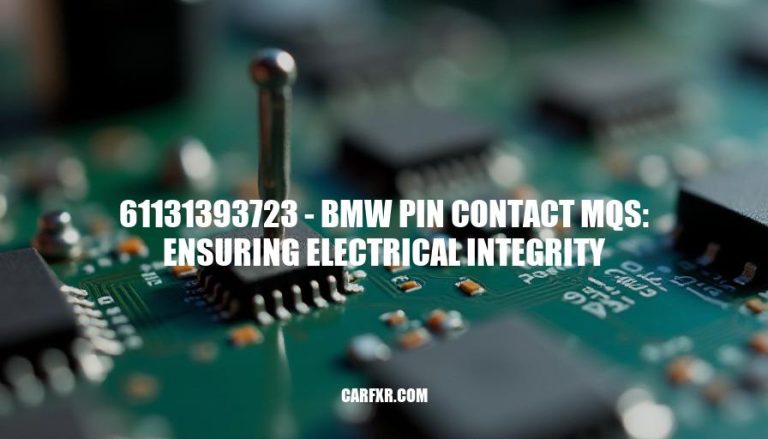
The BMW Part Pin Contact MQS 61131393723 is a crucial component in BMW vehicles, serving as a direct replacement part for various models from 1991 to 2020. This pin contact is integral to the electrical systems within BMW cars, ensuring reliable connections and optimal performance. Commonly used in models such as the BMW 1 Series, 3 Series, X3, and X5, this part plays a significant role in maintaining the vehicle’s electrical integrity.
Its importance in automotive maintenance and repair cannot be overstated, as a faulty pin contact can lead to various electrical issues, affecting the overall functionality of the vehicle. By using genuine BMW parts like the Pin Contact MQS 61131393723, owners can ensure their vehicles remain in peak condition, benefiting from the high-quality standards and durability that BMW is known for.
The BMW Part pin contact mqs 61131393723, also known as the Contact Pin MQS, is a genuine BMW part designed to ensure reliable electrical connections within various BMW models.
Manufacturer: BMW
Part Number: 61131393723
Item Weight: 0.40 pounds
Fitment Type: Direct Replacement
Material: Primarily copper with high-quality plastic components for insulation
This part is compatible with a wide range of BMW models from 1991 to 2020, including:
BMW 1 Series (E82, E88)
BMW 3 Series (E36, E46, E90, E92, F30)
BMW 5 Series (E60, E61)
BMW X3 (2004-2020)
BMW X5 (2000-2020)
BMW M3 (1995-2013)
The Contact Pin MQS is designed to provide a secure and stable connection for electrical components, ensuring optimal performance and longevity. It undergoes rigorous testing to meet BMW’s high standards for quality and reliability. The pin contact is engineered to withstand the electrical demands of various BMW systems, contributing to the overall efficiency and functionality of the vehicle’s electrical network.
The Contact Pin MQS is constructed using high-quality materials, including:
Copper: Used for the pin contact to ensure excellent conductivity and durability.
Plastic: Used for insulation and protection, providing resistance to wear and environmental factors.
This combination of materials ensures that the Contact Pin MQS can maintain reliable electrical connections even under demanding conditions, contributing to the overall performance and safety of the vehicle.
The BMW Part Pin Contact MQS 61131393723 is a crucial component in BMW vehicles, serving as a direct replacement part for various models from 1991 to 2020.
It ensures reliable connections and optimal performance by providing a secure and stable connection for electrical components.
The pin contact undergoes rigorous testing to meet BMW’s high standards for quality and reliability.
Using genuine BMW parts like the Pin Contact MQS 61131393723 can ensure vehicles remain in peak condition, benefiting from high-quality standards and durability that BMW is known for.
This part is compatible with a wide range of BMW models and is constructed using high-quality materials, including copper and plastic, to maintain reliable electrical connections even under demanding conditions.


